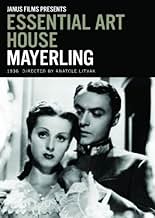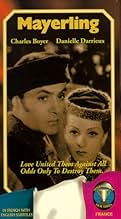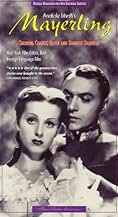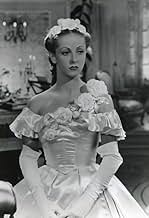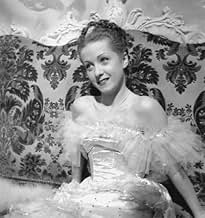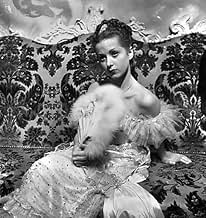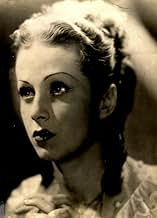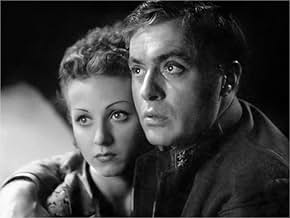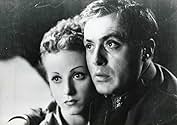L'histoire en 1889 dans l'empire hongrois, de l'archiduc Rodolphe de Habsbourg, qui marié, s'éprend pourtant d'une jeune fille.L'histoire en 1889 dans l'empire hongrois, de l'archiduc Rodolphe de Habsbourg, qui marié, s'éprend pourtant d'une jeune fille.L'histoire en 1889 dans l'empire hongrois, de l'archiduc Rodolphe de Habsbourg, qui marié, s'éprend pourtant d'une jeune fille.
- Réalisation
- Scénario
- Casting principal
- Récompenses
- 3 victoires et 1 nomination au total
Marthe Régnier
- La baronne Vetsera
- (as Marthe Regnier)
Assia Granatouroff
- La cousine de Marie
- (as Assia)
Christiane Ribes
- Une fille
- (as Ribès)
René Bergeron
- Szeps
- (as Bergeron)
Vladimir Sokoloff
- Le chef de la police
- (as Sokoloff)
Raymond Aimos
- Le premier policier
- (as Aimos)
André Siméon
- Le second policier
- (as Siméon)
Avis à la une
'Mayerling' (1936)
Opening thoughts: There were plenty of reasons for seeing 'Mayerling'. Have always loved period dramas, and especially when it is a period of history that really piques a lot of interest. Having gained a major interest in Austrian royalty since my holiday to Vienna last year (especially Empress Elisabeth, aka Sissi), this was one such period. It also intrigued seeing Charles Boyer in an early role and the kind that he became well known for and for seeing one of Anatole Litvak's early films.
'Mayerling' is a very, very good film indeed. Not perfection, but there are numerous good things and most of those good things are actually exceptional. Of the two 'Mayerling' films seen, the other being the one from the 50s, this is infinitely better with it actually being good (was underwhelmed by the other). It is very easy to see why Boyer became a major international star after this and the film is one of Litvak's best and most interesting early films (the film that also helped make his career bigger), as far as his films in general go it's not quite 'All This and Heaven Too' and especially 'The Snake Pit' but it is in the better end.
Bad things: It isn't perfect. Will agree that Gabrielle Dorziat wasn't right for Elisabeth, she came over as too old and didn't get enough of the ahead of the time astonishing beauty that Elisabeth was famous for the struggles she faced in her life.
Also thought that the lead up to the tragic conclusion was too overlong and dragged out.
Good things: However, 'Mayerling' looks absolutely ravishing, with sumptuous costume designs and art direction and the photography is some of the most beautiful of any film from the late 30s. Was not sure as to whether Arthur Honegger's music would gel stylistically and in mood, but it is suitably dramatic without being bombastic or too melodramatic and is quite lush. Litvak's direction is some of his most stylish and sensitive.
Furthermore, the script is thought provoking and doesn't go into soap opera territory too much. There may be cliches here but they are not done in too cliched a manner. The story always intrigues, even in the slower patches, and has emotional impact and very passionate romance. The conclusion itself is very moving and the love is very deeply felt.
Boyer and Danielle Darrieux are both perfectly cast, giving performances of great dignity and passion. Their chemistry smolders. The supporting cast are excellent too, with reservations had for only Dorziat.
Concluding thoughts: Overall, very, very good.
8/10.
Opening thoughts: There were plenty of reasons for seeing 'Mayerling'. Have always loved period dramas, and especially when it is a period of history that really piques a lot of interest. Having gained a major interest in Austrian royalty since my holiday to Vienna last year (especially Empress Elisabeth, aka Sissi), this was one such period. It also intrigued seeing Charles Boyer in an early role and the kind that he became well known for and for seeing one of Anatole Litvak's early films.
'Mayerling' is a very, very good film indeed. Not perfection, but there are numerous good things and most of those good things are actually exceptional. Of the two 'Mayerling' films seen, the other being the one from the 50s, this is infinitely better with it actually being good (was underwhelmed by the other). It is very easy to see why Boyer became a major international star after this and the film is one of Litvak's best and most interesting early films (the film that also helped make his career bigger), as far as his films in general go it's not quite 'All This and Heaven Too' and especially 'The Snake Pit' but it is in the better end.
Bad things: It isn't perfect. Will agree that Gabrielle Dorziat wasn't right for Elisabeth, she came over as too old and didn't get enough of the ahead of the time astonishing beauty that Elisabeth was famous for the struggles she faced in her life.
Also thought that the lead up to the tragic conclusion was too overlong and dragged out.
Good things: However, 'Mayerling' looks absolutely ravishing, with sumptuous costume designs and art direction and the photography is some of the most beautiful of any film from the late 30s. Was not sure as to whether Arthur Honegger's music would gel stylistically and in mood, but it is suitably dramatic without being bombastic or too melodramatic and is quite lush. Litvak's direction is some of his most stylish and sensitive.
Furthermore, the script is thought provoking and doesn't go into soap opera territory too much. There may be cliches here but they are not done in too cliched a manner. The story always intrigues, even in the slower patches, and has emotional impact and very passionate romance. The conclusion itself is very moving and the love is very deeply felt.
Boyer and Danielle Darrieux are both perfectly cast, giving performances of great dignity and passion. Their chemistry smolders. The supporting cast are excellent too, with reservations had for only Dorziat.
Concluding thoughts: Overall, very, very good.
8/10.
10Atiliano
I first saw this movie about 20 years ago in SBS Channel in Sydney, Australia. The movie was in the French language so I had to read the subtitles. It is a very old movie in B&W but it was a very enchanting movie. Danielle Darrieux was perfect for the role of the beautiful Anna Vetsera. Her acting was also perfect (for an innocent girl madly in-love with her prince). Whether the real Anna Vetsera was as innocent is beside the point. The movie was based on the true story of the love affair between the Archduke Rudolf (heir to the throne of Austria- Hungary) and his young mistress Baroness Anna Vetsera. They committed a suicide (or murder-suicide?) in 1889 in the Archduke's hunting lodge in Mayerling. Afterwards the title of Archduke passed on to the emperor's nephew, Franz Ferdinand (who became heir). Franz Ferdinand was assassinated in July 1914 in Sarajevo in Bosnia-Herzegovina which sparked the First World War. This movie has a very sad ending, with both lovers dying in the end. But the implications for the real world in that era was most terrible. It is a great wonder today whether there would have been war in 1914 had Rudolf lived and remained heir.
Recently, I was able to obtain a copy of the this movie and saw it again after 20 years. The movie did not disappoint and I can say that it is one of the best movies ever. It must have been such a sensation when first released in 1936.
Recently, I was able to obtain a copy of the this movie and saw it again after 20 years. The movie did not disappoint and I can say that it is one of the best movies ever. It must have been such a sensation when first released in 1936.
Joseph Kessel and Marcel Achard turned the book of Claude Annet "Mayerling" into a strong script with time to overlook the political situation in the Austrian Empire at that time. The costumes of Annenkov are impressive and the music of Arthur Honegger "Musique Nouvelle" goes well with the pathetism of this flamboyant movie. The Austrian emperor Joseph (Jean Dax) is historically correct and Marie Vetsera (Danielle Darieux) and Rudolph of Habsbourg (Charles Boyer) form a convincing couple with much love but without future.
Motion pictures from overseas were a tough sell for American theaters in the mid-1930s. Even though movies from France, Germany, Italy among others were shown in selected theaters in the United States, none caught the attention of the public accustomed to Hollywood glossy productions. When Pax Films imported the French movie, February 1936 "Mayerling," American viewers were enthralled about its story of a royal murder-suicide.
"Mayerling" became the first international hit with sound in cinema (with a couple of British pictures the exception). The film's popularity made French actor Charles Boyer a major world-wide movie star, and a barrage of offers from Hollywood studios for Anatole Litvak cascaded on its director. One reviewer labeled the film as "one of the most compelling love stories the cinema has produced," and the co-founder of the American Ballet, Lincoln Kirstein wrote it is "a kind of standard for the romantic film in an historical setting." The movie's title derives from the small town in Austria where Rudolf, the Crown Prince of Austria (Boyer), shot and killed his 17-year-old mistress, baroness Mary Vetsera (Danielle Darrieux) at his hunting lodge in January 1889. Rudolf was the only son to Emperor Franz Joseph of Austria and had been in an unhappy marriage to a princess from Belgium before meeting Mary. Compounding the royal couple's stress was Rudolf had transmitted the clap to his wife as a result of his many affairs.
Actress Darrieux, as Mary Vetsera, was almost the same age of the real-life teenager who was shot by the prince before he took his own life. Her four-year film career to this point resulted in only small parts, but "Mayerling" brought her international fame. Receiving a number of offers from Hollywood, Darrieux and Litvak traveled together to explore their opportunities in Tinseltown. Whereas the film director remained in California where he excelled in directing several highly-regarded films, Darrieux was in only one Universal Pictures film, 1938 'The Rage of Paris,' before returning to Europe. Darrieux eventually became one of France's most popular movie actresses with a career spanning eight decades, lasting until 2010.
Boyer, who had earlier spent a short time in Hollywood, returned to California to enjoy a very rewarding life in films. The book the film's plot was based on, Claude Anet's 'Idyll's End,' served as the basis for Litvak revisiting the tragic tale in his 1957 'Mayerling' with Mel Ferrer and Audrey Hepburn. MGM pounced on the bandwagon in 1968 in its version of "Mayerling" with Omar Sharif, Catherine Deneuve, James Mason and Ava Gardner.
It's ironic Boyer played a character who kills himself over a woman. The actor met and married British actress Pat Paterson just before making "Mayerling," a marriage that lasted 44 years. He was so distraught over her death in August 1978, that he took his own life with an overdose of Seconal two days after she passed away. As for the real Crown Prince Rudolf, his death left his father, Franz Joseph, to seek an alternative when he had no other sons to give the title. The emperor's heir apparent to the Austria-Hungry throne turned out to be his nephew, Archduke Franz Ferdinand, who, in 1914 was shot and killed in Sarajevo, setting off World War One.
"Mayerling" became the first international hit with sound in cinema (with a couple of British pictures the exception). The film's popularity made French actor Charles Boyer a major world-wide movie star, and a barrage of offers from Hollywood studios for Anatole Litvak cascaded on its director. One reviewer labeled the film as "one of the most compelling love stories the cinema has produced," and the co-founder of the American Ballet, Lincoln Kirstein wrote it is "a kind of standard for the romantic film in an historical setting." The movie's title derives from the small town in Austria where Rudolf, the Crown Prince of Austria (Boyer), shot and killed his 17-year-old mistress, baroness Mary Vetsera (Danielle Darrieux) at his hunting lodge in January 1889. Rudolf was the only son to Emperor Franz Joseph of Austria and had been in an unhappy marriage to a princess from Belgium before meeting Mary. Compounding the royal couple's stress was Rudolf had transmitted the clap to his wife as a result of his many affairs.
Actress Darrieux, as Mary Vetsera, was almost the same age of the real-life teenager who was shot by the prince before he took his own life. Her four-year film career to this point resulted in only small parts, but "Mayerling" brought her international fame. Receiving a number of offers from Hollywood, Darrieux and Litvak traveled together to explore their opportunities in Tinseltown. Whereas the film director remained in California where he excelled in directing several highly-regarded films, Darrieux was in only one Universal Pictures film, 1938 'The Rage of Paris,' before returning to Europe. Darrieux eventually became one of France's most popular movie actresses with a career spanning eight decades, lasting until 2010.
Boyer, who had earlier spent a short time in Hollywood, returned to California to enjoy a very rewarding life in films. The book the film's plot was based on, Claude Anet's 'Idyll's End,' served as the basis for Litvak revisiting the tragic tale in his 1957 'Mayerling' with Mel Ferrer and Audrey Hepburn. MGM pounced on the bandwagon in 1968 in its version of "Mayerling" with Omar Sharif, Catherine Deneuve, James Mason and Ava Gardner.
It's ironic Boyer played a character who kills himself over a woman. The actor met and married British actress Pat Paterson just before making "Mayerling," a marriage that lasted 44 years. He was so distraught over her death in August 1978, that he took his own life with an overdose of Seconal two days after she passed away. As for the real Crown Prince Rudolf, his death left his father, Franz Joseph, to seek an alternative when he had no other sons to give the title. The emperor's heir apparent to the Austria-Hungry throne turned out to be his nephew, Archduke Franz Ferdinand, who, in 1914 was shot and killed in Sarajevo, setting off World War One.
This is the original movie version of the murder/suicide pact between Archduke Rudolph, heir to the throne of the Austro-Hungarian empire, and his mistress, Baroness Marie Vetsera. Made in France and subtitled for the English speaking audience, it stars Charles Boyer as Rudolph and Danielle Darrieux as Marie. Boyer obviously appeared to better advantage in French films... .....his whole persona appears different than that in his American roles. His interpretation of Rudolph is one of a tortured man who does not have much to do while waiting around to inherit the throne, so he dallies with Marie Vetsera and falls in love with her. Danielle Darrieux is bewitching as the Baroness.
The story unfolds to the inevitable conclusion of murder/suicide which threw the Empire into turmoil. History may record the events of what happened at Mayerling a little differently but it surely makes a good story of thwarted love and royal politics. The 1968 remake with Omar Shariff and Catherine Deneuve is not bad either. This legendary romance has fascinated people since the turn of the century. So have the Kleenex handy and enjoy!!
The story unfolds to the inevitable conclusion of murder/suicide which threw the Empire into turmoil. History may record the events of what happened at Mayerling a little differently but it surely makes a good story of thwarted love and royal politics. The 1968 remake with Omar Shariff and Catherine Deneuve is not bad either. This legendary romance has fascinated people since the turn of the century. So have the Kleenex handy and enjoy!!
Le saviez-vous
- AnecdotesOne of the first foreign films with sound to become a hit in the United States. It made an international star out of Charles Boyer.
- ConnexionsFeatured in Scissors (1991)
Meilleurs choix
Connectez-vous pour évaluer et suivre la liste de favoris afin de recevoir des recommandations personnalisées
Détails
Box-office
- Montant brut aux États-Unis et au Canada
- 240 000 $US
- Durée
- 1h 36min(96 min)
- Couleur
- Rapport de forme
- 1.33 : 1
Contribuer à cette page
Suggérer une modification ou ajouter du contenu manquant

